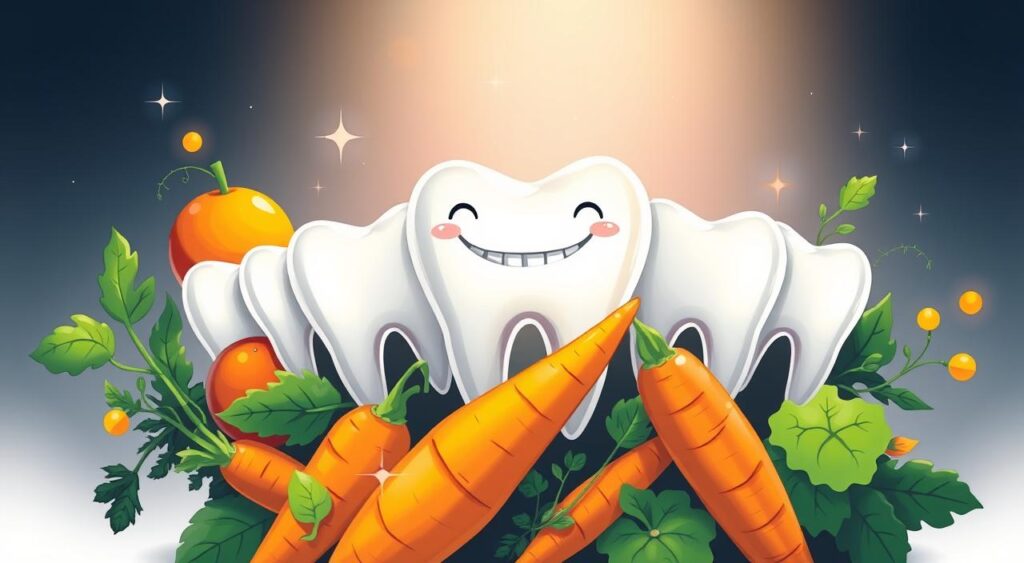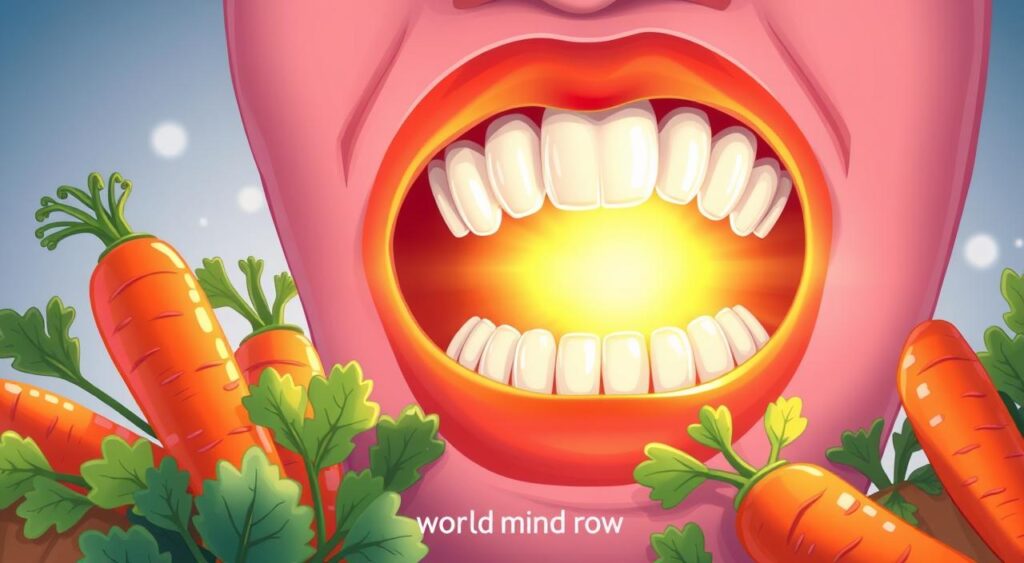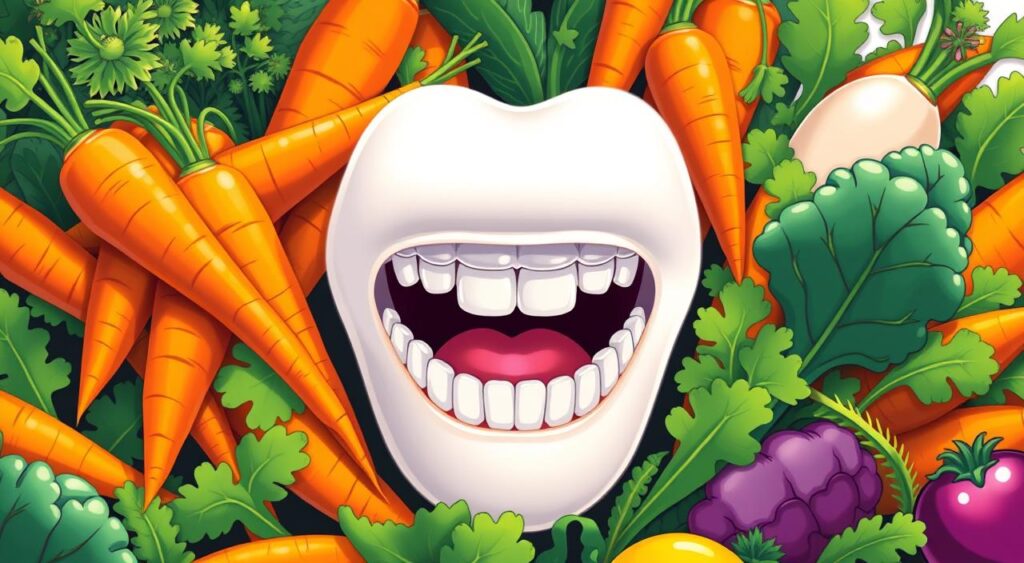Your diet is key to keeping your mouth healthy. Vitamin A and teeth are vital nutrients often overlooked. This guide will cover how vitamin A helps your teeth and gums, supports oral health, and give tips on adding it to your daily meals.
Table of Contents
Key Takeaways
- Vitamin A is essential for the health and development of your teeth and gums.
- It is vital in enamel formation, saliva production, and oral hygiene.
- Incorporating vitamin A-rich foods, such as carrots, sweet potatoes, and leafy greens, can help support your dental well-being.
- Excessive vitamin A intake can lead to potential risks, so it’s important to maintain a balanced diet.
- Regular dental check-ups and good oral hygiene habits are crucial for maintaining a healthy smile.
Vitamin A: The Unsung Hero for Oral Health
Most people know that vitamins like calcium and vitamin C are needed for good mouth health. But, vitamin A is often overlooked. It’s vital for keeping your teeth and gums healthy.
What is Vitamin A, and Why is it Important?
Vitamin A is a fat-soluble vitamin with many benefits. It helps with vision, immune function, and cell growth. For your mouth, it’s vital for strong tooth enamel and gum tissue.
How Vitamin A Supports Healthy Teeth and Gums
Vitamin A is crucial for tooth enamel, the hard layer protecting teeth. It keeps gum tissue healthy and helps make saliva, which is key for cleaning your mouth and fighting acid.
Vitamin A also fights inflammation, lowering the risk of gum disease. This nutrient supports your teeth and gums, leading to a healthier smile and better oral health.
“Vitamin A is an unsung hero when it comes to maintaining a healthy mouth. It’s essential for keeping your tooth enamel strong and your gums in top shape.”
Eat foods high in vitamin A, such as carrots, sweet potatoes, leafy greens, and dairy, to support your mouth health. Making vitamin A a key part of your diet helps keep your teeth and gums healthy for a long time.
Incorporating Vitamin A into Your Diet
Getting enough vitamin A is key for healthy teeth and gums. This nutrient is crucial for oral health. Luckily, it’s found in many tasty foods.
Add rich foods to your meals and snacks to get enough vitamin A. Top foods include:
- Carrots
- Sweet potatoes
- Leafy green vegetables (e.g., spinach, kale, and collard greens)
- Dairy products (e.g., milk, cheese, and yogurt)
- Egg yolks
- Fatty fish (e.g., salmon and tuna)
Adults need 900 micrograms of vitamin A daily. Including these foods in your diet helps meet your needs. This supports your oral health.
If diet alone doesn’t provide enough vitamin A, consider supplements. But talk to your doctor before starting any supplements.
“Incorporating vitamin A-rich foods into your diet is a simple and delicious way to support your teeth and gums.”
Adding more vitamin A to your daily routine helps keep your smile healthy. Look for vitamin A-rich foods to add to your meals and snacks. This supports your oral health.
Vitamin A and Teeth: Synergistic Effects

Vitamin A is key to keeping your teeth healthy and strong. It helps make tooth enamel and is important for saliva production. Saliva is crucial for keeping your mouth clean and preventing cavities.
The Role of Vitamin A in Enamel Formation
Vitamin A is vital for tooth enamel, the outer layer that protects teeth. It helps cells called ameloblasts grow and work properly, ensuring that enamel gets the minerals it needs to be strong.
This strong enamel protects teeth from decay and damage. Vitamin A keeps teeth strong and able to withstand daily wear and tear.
Vitamin A’s Impact on Saliva Production
Vitamin A also affects saliva production, vital for a healthy mouth. Saliva neutralizes mouth acid, cleans food bits, and fights off harmful bacteria. With enough vitamin A, your mouth makes more saliva.
This keeps your mouth moist and protected from cavities and other dental issues.
Knowing how vitamin A helps your teeth, you can eat rich foods. This supports your mouth’s health, vitamins and vitamins and oral health.
| Nutrient | Function | Food Sources |
|---|---|---|
| Vitamin A | Supports enamel formation and saliva production | Carrots, sweet potatoes, leafy greens, dairy products |
Vitamin A and Teeth: Potential Risks and Precautions

Vitamin A is vital for good oral health. But, too much of it can be harmful. Taking too much vitamin A can cause vitamin A toxicity. This can harm your teeth and overall health.
Understanding Vitamin A Toxicity
Vitamin A toxicity, or hypervitaminosis A, happens when you take too much vitamin A. This can come from too many supplements or high-dose vitamin A drugs. Signs of vitamin A toxicity include:
- Dry, cracked lips and mouth
- Increased tooth sensitivity and gum inflammation
- Bone and joint pain
- Headaches and nausea
- Liver damage
Always talk to your doctor to ensure you’re not taking too much vitamin A. Adults should aim for 3,000-5,000 IU (international units) per day.
Eating a balanced diet is the best way to get enough vitamins and minerals, including vitamin A. Be careful with your vitamin A intake and get advice from a professional. This way, you can enjoy the benefits of vitamin A safely.
Conclusion
This guide has shown how important vitamin A is for oral health. It helps make strong tooth enamel and keeps saliva healthy. Vitamin A is a key player in keeping teeth and gums in top shape.
Eating foods high in vitamin A, such as carrots, sweet potatoes, and leafy greens, helps keep your mouth healthy. A balanced diet is crucial for good oral health.
Talk to your healthcare provider if you’re worried about getting enough vitamin A for your teeth. They can create a plan to ensure you get the right amount, which will help keep your smile bright and healthy. Muscle milk is another good food for body building.
FAQ
What is the importance of Vitamin A for oral health?
Vitamin A is key for keeping teeth and gums healthy. It helps make and keep tooth enamel strong, keeps gum tissue healthy, and boosts saliva production. All these are vital for good oral health.
How does Vitamin A support healthy teeth and gums?
Vitamin A is important for strengthening tooth enamel and keeping gum tissue healthy. It also helps make saliva, which is key for cleaning away food and bacteria, fighting acids, and preventing cavities.
What are the best dietary sources of Vitamin A?
Sweet potatoes, carrots, leafy greens, dairy, and some fish are great sources of vitamin A. Eating these foods daily can help you get the Vitamin A your body needs.
Can you get too much Vitamin A?
Overeating Vitamin A can cause problems like hair loss, liver damage, and bone pain. To avoid these risks, it’s essential to stick to the daily recommended amount.
How can I incorporate more Vitamin A into my diet?
You can increase your Vitamin A by adding sweet potato fries or roasted carrots to meals. Blend leafy greens into smoothies and choose dairy like yogurt or cheese. If diet alone doesn’t meet your needs, talk to your healthcare provider about supplements.
